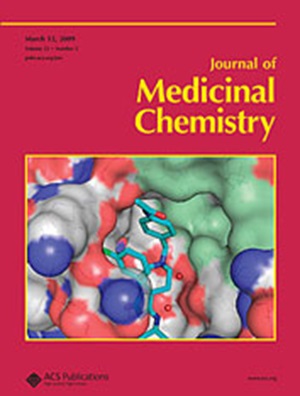对抗人类腺病毒的小分子策略:进展、挑战和未来展望
IF 6.8
1区 医学
Q1 CHEMISTRY, MEDICINAL
引用次数: 0
摘要
人腺病毒(HAdVs)对健康构成重大威胁,特别是对免疫功能低下的个体,其感染可发展为严重的、危及生命的疾病。尽管它们具有临床效果,但fda批准的抗病毒疗法中没有专门针对hav感染的。目前的治疗方法,如未经核准的西多福韦,受到肾毒性、口服生物利用度差和耐药性问题的限制,强调迫切需要更安全、更有效的替代品。这一观点批判性地评估了小分子抗hav药物开发的最新进展,强调了有前途的分子支架、创新的筛选方法和靶向宿主的策略。除了重新利用药物,我们强调探索不同化学空间和将基于结构的设计与高通量表型筛选相结合的重要性。通过整合药物化学、病毒学和药理学的观点,讨论了优化抗hav药物发现和加速下一代治疗方法转化为临床应用的相关挑战和战略考虑。本文章由计算机程序翻译,如有差异,请以英文原文为准。

Small-Molecule Strategies against Human Adenoviruses: Progress, Challenges, and Future Perspectives
Human adenoviruses (HAdVs) present a significant health threat, particularly to immunocompromised individuals, where infections can progress to severe, life-threatening disease. Despite their clinical impact, no FDA-approved antiviral therapies specifically target HAdV infection. Current treatments, such as off-label cidofovir, are limited by nephrotoxicity, poor oral bioavailability, and resistance concerns, underscoring the urgent need for safer and more effective alternatives. This perspective critically evaluates recent advances in small-molecule anti-HAdV drug development, highlighting promising molecular scaffolds, innovative screening methodologies, and host-targeted strategies. Beyond repurposed drugs, we emphasize the importance of exploring diverse chemical spaces and integrating structure-based design with high-throughput phenotypic screening. By integrating insights from medicinal chemistry, virology, and pharmacology perspectives, the relevant challenges and strategic considerations to optimize anti-HAdV drug discovery and accelerate the translation of next-generation therapeutics into clinical application are discussed.
求助全文
通过发布文献求助,成功后即可免费获取论文全文。
去求助
来源期刊

Journal of Medicinal Chemistry
医学-医药化学
CiteScore
4.00
自引率
11.00%
发文量
804
审稿时长
1.9 months
期刊介绍:
The Journal of Medicinal Chemistry is a prestigious biweekly peer-reviewed publication that focuses on the multifaceted field of medicinal chemistry. Since its inception in 1959 as the Journal of Medicinal and Pharmaceutical Chemistry, it has evolved to become a cornerstone in the dissemination of research findings related to the design, synthesis, and development of therapeutic agents.
The Journal of Medicinal Chemistry is recognized for its significant impact in the scientific community, as evidenced by its 2022 impact factor of 7.3. This metric reflects the journal's influence and the importance of its content in shaping the future of drug discovery and development. The journal serves as a vital resource for chemists, pharmacologists, and other researchers interested in the molecular mechanisms of drug action and the optimization of therapeutic compounds.
 求助内容:
求助内容: 应助结果提醒方式:
应助结果提醒方式:


